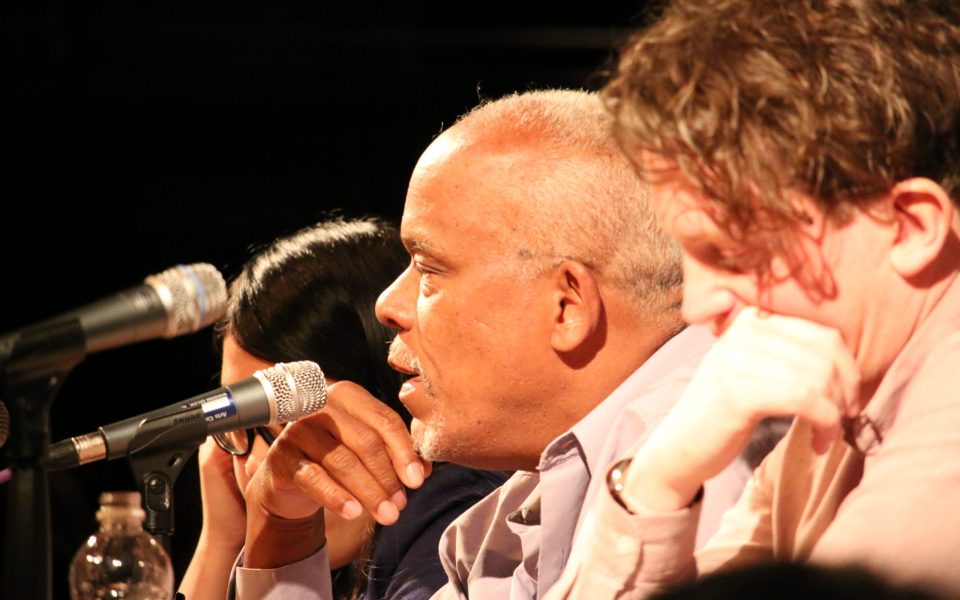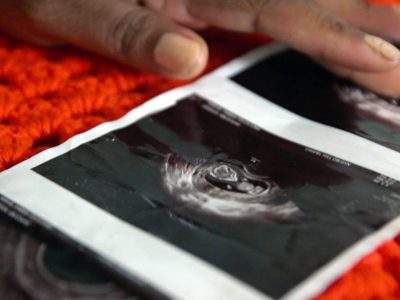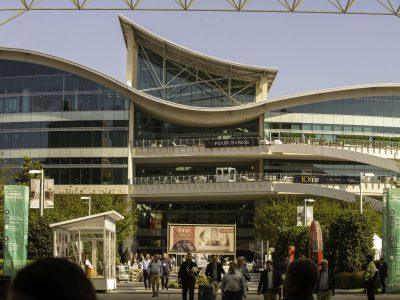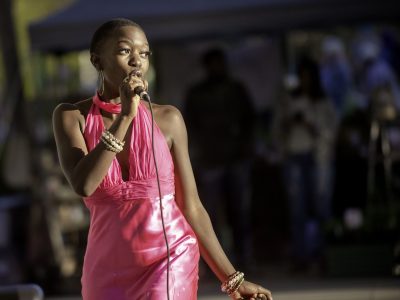by Brian Clarey
It’s not every day a student filmmaker gets a critique from a bonafide genius.
But Stanley Nelson, who has made award-winning documentaries about the Freedom Riders, the Jonestown Massacre and a trove of civil rights pieces, also won a MacArthur Fellow “genius grant” in 2002.
And the guy gives great notes.
While in town to accept RiverRun’s Master of Cinema Award, Nelson sat in on a panel for the annual Pitchfest, judging the best idea from film students at five area colleges. Just one would win the cash prize, but everyone received some great advice.
Samuel Wallace of Western Carolina University presented a pitch about twin high school football coaches from his hometown. He has interviews with the brothers, footage of their home lives — they live across the street from one another — and lots of screen time of the hardasses motivating their players in practices and games. It’s enough, Wallace thinks, for a 20-minute documentary short. Plus he’s a twin himself, which he says gives him insight into the special bond the brothers share.
After some input from fellow judge Oli Harbottle, a Brit with the leading United Kingdom documentary-distribution firm — “Any plans for an observational element? Following their daily lives both on and off the pitch.” — Nelson flexed his considerable storytelling muscle.
“You’ve got to push whatever tensions that exist between the two,” Nelson said, “Because this can’t be ‘Ode to the Wonderfulness of Being a Twin.’ There’s a certain sadness about grown twins, how they know things will never be the way they were when they were kids, and always together.
“Twenty minutes is a long time,” he continues. “It’s a short film but it’s a long time. It needs some tension, some story to push ahead. What happens?”
“Also,” he said, “that narrator is bad.”
Nelson had already given a technical note to Brittany Brock, of the UNC School of the Arts, who pitched a short called “Crocker,” about a poor, white rapper from her hometown of Spartanburg, SC who sparked a creative and political movement in the town before he died suddenly.
“The question with a film like this, when someone’s passed,” he told her, “is, ‘Can they tell this story?’ And it looks like you can.”
The two strongest pitches of the night belonged to students from Elon and Wake Forest universities.
Kathryn Jeffords and Kayla Hammer, from Elon, sold a seven-minute doc about two women from Greensboro Roller Derby. “Bout Queens” uses the derby match between Greensboro and rival Charlotte as backdrop for profiles of two women who both became empowered by the sport. Nelson advised them to treat the derby bouts as action sequences.
Bryan Campbell from Wake Forest had thrown in with the niece of aid worker and activist Fred Curry, who had disappeared after a controversial water mission in Sarajevo, the capital of Bosnia and Herzegovina. Campbell had reels of historical footage and still photos from war zones where his subject did his best work, as well as access to all surviving family members.
All the judges agreed that Campbell had enough to make the film, though they awarded First Place to the Elon team, making Wake runner-up.
But the competition seemed a mere backdrop against the words put forth by Nelson, inspiring every filmmaker in the room.
“Look at today,” he said from the podium during the Q&A that followed. “I’m getting this award today. But this is 30 minutes of my life. Most of it, 99.9 percent of it is me, alone in a dark room in front of a screen.”
Jeffords from the Elon team raised her hand to ask a question.
“How do you know when your film is done?” she asked.
“Your money runs out,” Nelson said, without missing a beat.
Join the First Amendment Society, a membership that goes directly to funding TCB‘s newsroom.
We believe that reporting can save the world.
The TCB First Amendment Society recognizes the vital role of a free, unfettered press with a bundling of local experiences designed to build community, and unique engagements with our newsroom that will help you understand, and shape, local journalism’s critical role in uplifting the people in our cities.
All revenue goes directly into the newsroom as reporters’ salaries and freelance commissions.







Leave a Reply